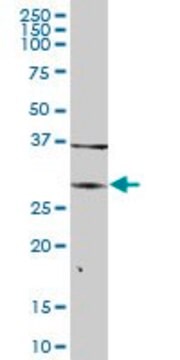General description
Serine/threonine-protein kinase Sgk1 (EC 2.7.11.1; UniProt O00141; also known as Serum/glucocorticoid-regulated kinase 1) is encoded by the SGK1 (also known as SGK) gene (Gene ID 6446) in human. SGK1 is a serine/threonine kinase that is induced in response to a variety of stimuli, including serum, osmotic shock, FSH, glucocorticoids, and mineralocorticoids. It is expressed in most tissues with highest levels observed in in the pancreas, followed by placenta, kidney, and lung. SGK1 is involved in the regulation of a wide variety of ion channels, membrane transporters, cellular enzymes, transcription factors, neuronal excitability, cell growth, proliferation, survival, migration and apoptosis. It is also reported to play an important role in cellular stress response. It is also involved in the regulation of renal sodium retention and potassium elimination. SGK1 activity is regulated by phosphorylation and is activated by phosphorylation on Ser422 by mTORC2. This phosphorylation transforms it into a substrate for PDPK1, which phosphorylates it on Thr256. Phosphorylation on Ser397 and Ser401 are also considered to be essential for its activity. It is negatively regulated by ubiquitination and proteasome degradation. High levels of expression of SGK1 gene may contribute to conditions such as hypertension and diabetic nephropathy. SGK1 has been reported to be up-regulated in non-small cell lung cancer (NSCLC) and its over-expression promotes the growth and migration of NSCLC cells via GSK-3 beta phosphorylation and activation of beta-catenin/TCF signaling.
Ref.: Xiaobo, Y et al. (2016) Gene 576, 339-346.
Specificity
Clone 1G2.1 was raised against SGK1 N-terminal fragment, reactivity towards human spliced isoforms 2-5 and murine spliced isoforms 2 and 3 are possible only if the epitope lies outside the first 25-amino acids of isoform 1.
Immunogen
GST-tagged recombinant human SGK1 fragment corresponding to the region N-terminal to the kinase domain.
Application
Detect SGK1 using this mouse monoclonal Anti-SGK1 Antibody, clone 1G2.1, Cat. No. MABS1476, validated for use in Immunohistochemistry (Paraffin) and Western Blotting.
Immunohistochemistry Analysis: A 1:1,000 dilution from a representative lot detected SGK1 immunoreactivity in human pancreas, mouse cerebellum, and rat uterus tissue sections.
Western Blotting Analysis: 1 µg/mL from a representative lot detected SGK1 in 10 µg of human (A431, HEK293, HeLa, HepG2, HUVEC, Jurkat, PC3), mouse (NIH/3T3, Raw 264.7), and rat (L6, PC12) cell lysates, as well as in 10 µg of human placenta and mouse brain tissue homogenates.
Research Category
Signaling
Quality
Evaluated by Western Blotting in mouse C2C12 cell lysate.
Western Blotting Analysis: 1 µg/mL of this antibody detected SGK1 in 10 µg of mouse C2C12 cell lysate.
Target description
~55 kDa observed. 48.94/48.93/48.93 kDa (human/mouse/rat isoform 1) calculated. Uncharacterized bands may be observed in some lysate(s).
Physical form
Format: Purified
Protein G purified.
Purified mouse IgG1 in buffer containing 0.1 M Tris-Glycine (pH 7.4), 150 mM NaCl with 0.05% sodium azide.
Storage and Stability
Stable for 1 year at 2-8°C from date of receipt.
Other Notes
Concentration: Please refer to lot specific datasheet.
Disclaimer
Unless otherwise stated in our catalog or other company documentation accompanying the product(s), our products are intended for research use only and are not to be used for any other purpose, which includes but is not limited to, unauthorized commercial uses, in vitro diagnostic uses, ex vivo or in vivo therapeutic uses or any type of consumption or application to humans or animals.
